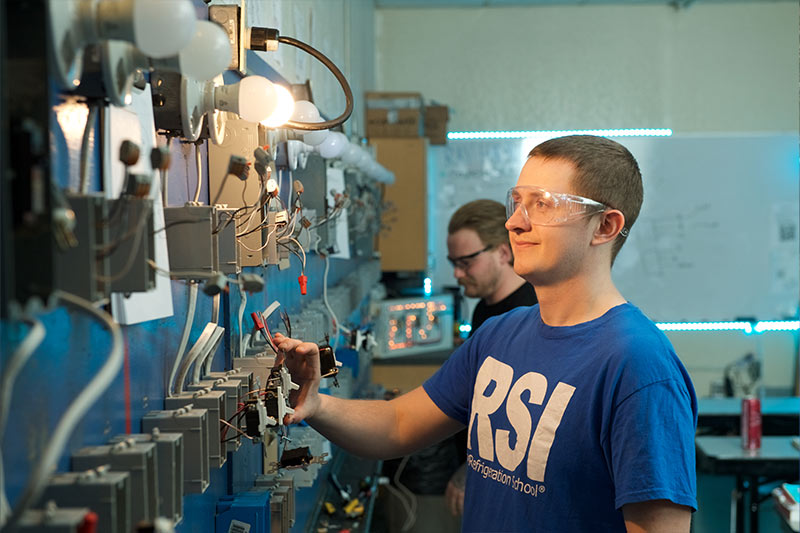RSI is a Great Training Option for Everyone
Learn more about how we can prepare you to advance your career.
Electricity is critical in modern society, powering our daily activities and essential services like healthcare and communication. It has become an essential utility that we rely on for our everyday life. From lighting our homes and offices to operating appliances, computers, and electronic devices, electricity is deeply integrated into our daily activities.
Ready to explore AC and DC electricity and delve deeper into what electro-mechanical technicians should know about these two electricity types?
Understanding AC and DC Electricity
AC (alternating current) is an electric current that periodically changes direction and magnitude over time. It is commonly used for power transmission and is easily converted to different voltages using transformers. There are several indicators that must be considered with AC power supply:
Peak Voltage – the maximum value of amplitude a wave can reach.
Frequency – the number of cycles in a wave per second.
Get Started on the Path to a New Career
Fill out our form to learn how we can help you change your life.
Mean Voltage – average value of all the points the voltage takes during one cycle.
Root Mean Square Voltage – the square root of the mean over one cycle of the square of the instantaneous voltage.
DC (direct current), on the other hand, flows in a single direction without changing its magnitude or direction. DC is widely used in electronic devices and batteries.
The rivalry between Thomas Edison and Nikola Tesla during the War of the Currents played a significant role in the development of AC and DC power systems. Tesla’s AC system, with its ability to transmit electricity efficiently over long distances, eventually gained widespread acceptance and became the foundation for modern power grids.
What Do Electro-Mechanical Technicians Do?
Electro-mechanical technicians are skilled professionals who work with electrical and mechanical technologies. They install, test, maintain, and repair complex systems in various industries.
These technicians possess a strong understanding of electrical and mechanical principles, allowing them to troubleshoot and diagnose issues effectively. Their expertise includes electrical wiring, circuitry, control systems, and mechanical components.
Electro-Mechanical Technicians and AC/DC Electricity
Electro-mechanical technicians play a vital role in operating, testing, maintaining, and repairing electro-mechanical and mechatronic equipment. They combine mechanical and electrical knowledge to work with automated systems.
Understanding AC and DC electricity is essential for electro-mechanical technicians to interpret schematics, troubleshoot electrical issues, and ensure the proper functioning of the equipment they handle.
AC power is commonly used for power transmission and distribution, while DC power finds applications in electronics, batteries, and automotive systems. Various industries, including manufacturing, engineering, telecommunications, and transportation, rely on both AC and DC power systems for their operations.
How Can You Train to Become an Electro-Mechanical Technician?
Electro-mechanical technology programs typically require 9 months of study and provide a mix of theoretical knowledge and hands-on training.
The curriculum covers subjects such as electrical circuits, electronics, mechanics, automation, robotics, manufacturing processes, instrumentation, control systems, and fluid power. You gain proficiency in both electrical and mechanical technologies, allowing you to work with electromechanical systems.
RSI also offers specialized courses in HVAC/R systems, preparing you for careers in heating, ventilation, air conditioning, and refrigeration. The program aims to equip you with the skills and knowledge necessary to become competent electro-mechanical technicians.
What Do You Learn in an Electro-Mechanical Technology Program?
An electromechanical technology program offers key learnings in various areas.
You will gain knowledge in the fundamentals of solar technology and its integration with electrical systems, enabling you to understand the principles of solar energy generation and its incorporation into the electrical grid.
You also learn about electrical wiring and circuitry, which includes interpreting wiring diagrams, performing installations, and troubleshooting electrical issues.
The basics of refrigeration are covered, emphasizing their application in HVAC systems, and providing you with the knowledge to design, install, and maintain these systems.
Additionally, advanced troubleshooting techniques are taught to enable you to identify and resolve complex issues in electro-mechanical systems.
Want To Learn More?
This 9-month Electro-Mechanical Technologies Training program provides training based on a broad range of knowledge in electrical and mechanical technologies, along with heating, ventilation, air conditioning, and refrigeration.
Courses focus on the fundamentals of electricity, residential and commercial wiring, and comfort systems. An added value to the electromechanical technician training is the solar energy technology module which features an overview of the Photovoltaic (PV) Science with principles and application processes used in many solar-powered systems. To learn more, contact us.
Additional Sources
This blog has been labeled as archived as it may no longer contain the most up-to-date data. For a list of all current blog posts, please visit our blog homepage at https://www.rsi.edu/blog/




